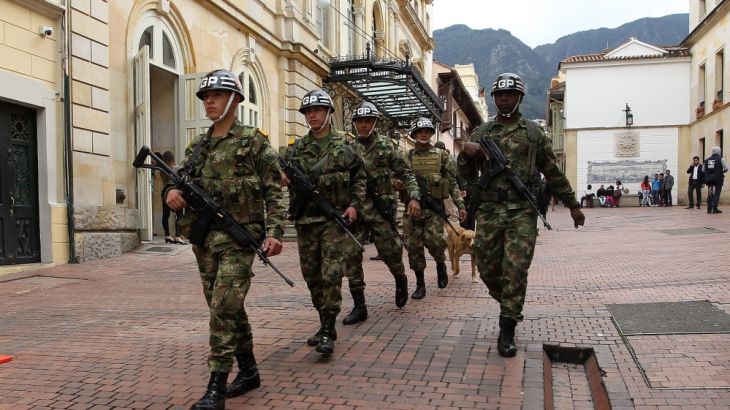Colombians divided on FARC peace deal
Wave of alleged assassinations in conflict areas raises pressure on government to sign revised peace accord.

Colombia’s government and the armed group FARC are due to sign a revised peace accord to end their half-century conflict despite bitter complaints from opponents.
Public opinion is divided on the signing of the deal, scheduled for Thursday, as some overwhelmingly loathe the FARC, or the Revolutionary Armed Forces of Colombia, for crimes such as kidnappings and drug-trafficking, while others want peace to prevail.
Keep reading
list of 4 itemsColombia agrees with ELN rebel group to extend truce
Amid uptick in kidnappings, Colombian family receives ‘biggest gift of all’
Her son was killed by the Colombian military. Now, she’s getting an apology
However, a recent wave of alleged assassinations in conflict areas has raised pressure on the government to seal a peace deal fast.
“There is no time to waste,” President Juan Manuel Santo said in a televised statement on Monday.
READ MORE: Colombia reaches new peace deal with FARC rebels
“Lives have been lost and many more are in danger.”
The revised deal aims to end 52 years of conflict that has killed more than 220,000 people and displaced millions.
Santos and Rodrigo “Timochenko” Londono, the FARC leader, signed an earlier version of the deal in a triumphant ceremony with international leaders on September 27.
But Colombians narrowly rejected it in a referendum on October 2.
Period of uncertainty
Now, a period of discord and uncertainty looks certain as opponents threaten to resist the revised deal.
“We invite citizens to persist in the struggle for the future of democracy,” said the Democratic Center party led by Alvaro Uribe, the conservative ex-president.
“In the coming days, we will examine various actions to call the people into the streets and democratic spaces,” the party said in a statement.
Al Jazeera’s Alessandro Rampietti, reporting from Bogota, said Santos is determined to go ahead despite the opposition.
“This new deal will not go to a second referendum,” he said. “Instead, President Santos said, the government will introduce it in Congress and it will probably be approved there.”
However, public opinion in the capital Bogota remains deeply divided.
“I think the FARC needs to pay for all they’ve done. I don’t support this deal because they inflicted too much damage,” Diana Ocampo, a Colombian resident, told Al Jazeera.
“They should have negotiated in a different way. They are giving them too much power. What they want is power to manipulate people and turn this in another Cuba.”
Uribe’s demands
Government and FARC negotiators presented the redrafted version earlier this month.
Uribe, however, complained that it still did not satisfy his key demands, notably punishing FARC leaders for their crimes.
Under the deal, the FARC would disarm and transform into a political party.
Uribe and his allies say the group’s leaders should not be allowed to run for office while still serving their sentences.
“I think the agreement is not perfect. I think there will be impunity. I think these people remain criminals even if they are respecting the agreement,” Ignacio Greiffenstein, a Bogota resident, told Al Jazeera.
“I don’t think the victims will be fully compensated. But even considering all this, I still believe we need to support the deal for the victims and to avoid further deaths.”